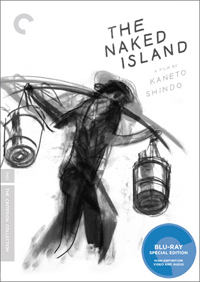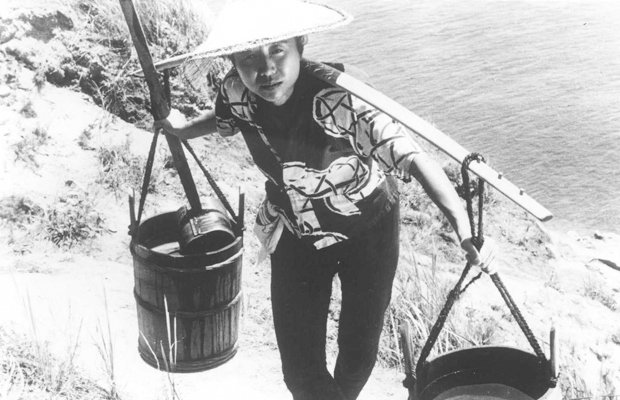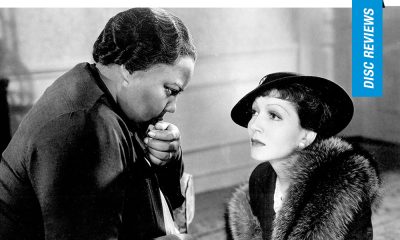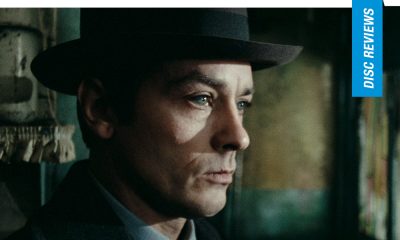Disc Reviews
Criterion Collection: The Naked Island | Blu-ray Review
 In the US, Japanese auteur Kaneto Shindo is best remembered for a small handful of titles, a mere fraction of his prolific output as a director and screenwriter spanning from the 1940s to 2010. Having penned over two hundred scripts and directed forty-eight features, he would continue to work until closely before his death with 2010’s Postcard. Criterion restores his first international breakout, 1960’s The Naked Island, a visual poem documenting a nuclear family of farmers valiantly engaged in back-breaking labor to secure the prosperity of their land before eventually visited by tragedy. The nearly dialogue free depiction initially plays like a documentary hybrid but eventually envelopes its audience into a hypnotic trance, broke sporadically by flurries of interactions. Objective and observational, it plays like a symbolic homage to the toils of the working class, humans who have overcome great odds to conquer the land and generate livelihoods.
In the US, Japanese auteur Kaneto Shindo is best remembered for a small handful of titles, a mere fraction of his prolific output as a director and screenwriter spanning from the 1940s to 2010. Having penned over two hundred scripts and directed forty-eight features, he would continue to work until closely before his death with 2010’s Postcard. Criterion restores his first international breakout, 1960’s The Naked Island, a visual poem documenting a nuclear family of farmers valiantly engaged in back-breaking labor to secure the prosperity of their land before eventually visited by tragedy. The nearly dialogue free depiction initially plays like a documentary hybrid but eventually envelopes its audience into a hypnotic trance, broke sporadically by flurries of interactions. Objective and observational, it plays like a symbolic homage to the toils of the working class, humans who have overcome great odds to conquer the land and generate livelihoods.
A father (Taiji Tonoyama) and mother (Noboku Otowa, wife of Kaneto Shindo) live alone on a remote island in the Setonaikai archipelago with their two young sons (Shinji Tanaka, Masanori Horimoto). Every day, they take a boat to a larger neighboring island, scoop up fresh water into buckets, and bring them back home to disseminate on their own crops. Their sons do what they can in their parents’ absence, usually fishing for food and keeping the home clean. One of the boys occasionally accompanies his mother to the larger island to attend school, the only moments where a hum of livelihood existents not entirely spent on labor or eating. Their humdrum lives are only broken up twice by the unexpected, first by the capture of a large fish by the boys, which the family sells on the large island to a deli. And then, a horrible tragedy takes the lives of one of their sons, allowing for a brief mourning period before everything returns once more to the grueling way it was.
For those mainly familiar with Shindo’s superb genre classics, like the celebrated Onibaba (1964) and Kuroneko (1968), it’s interesting to see the same humanistic vein without the aid of supernatural elements. Shindo had already helmed a number of features throughout the 1950s, but it was The Naked Island which saved the studio Kindai Eiga Kyokai from bankruptcy. Already we can see him favoring the perspective of the vulnerable, particularly women and children, characters here stuck in an impossible process when they didn’t necessarily desire or ask to be there. Dialogue isn’t shared between them, their dinners focused on the consumption of their meals and little else. It would seem the parents are barely aware of one other, until a moment where she makes an error, inspiring his violent ire.
Shindo’s spare ode to humans eking out an existence as ants is greatly enhanced by his regular DP Kiyomu Kuroda. Close-ups on the water being doled out on their hill-side pasture takes on a hopeless pallor, their Sisyphean activities fruitless because they never get to enjoy the products of their labor. It’s nearly forty minutes before we hear human voices, and those belong to the folks on the neighboring island, where bursts of music and joyful human interaction seem alien.
Shindo’s use of space differs greatly from Japan’s greatest examiner of composition, Yasujiro Ozu, an auteur whose characters are studied under more stifling frames. Shindo’s characters here have the possibility of their own freedom at their fingertips, but have become slaves to a necessary repetition. This being one of Shindo’s signature titles, it’s very much in line with his predilection for showcasing humans in isolation and how this warps their worldview. The evidence of their disassociation is reflected in their reaction to the death of their child. After the funeral, the mother breaks down during her return to toiling on the hill, sobbing in the soil as her husband looks on without succor, continuing to till the earth. Spare but succinct in its captivation, The Naked Island is greatly enhanced by a beautiful score by Hikaru Hayashi, which serves as the voice and spirit of the film.
Disc Review:
Criterion presents the title in a new high-definition digital restoration (previously the best version available was an increasingly hard to attain copy from UK label Eureka!) for this superb addition to the collection (which joins Shindo’s other two greatest hits). Prior to his death in 2012, a retrospective of Shindo’s filmography resulted in a video introduction, included here, as well as optional audio commentary recorded in 2000 of both the director and composer Hikaru Hayashi.
Kaneto Shindo:
This seven minute excerpt is from a video Kaneto Shindo recorded in 2011 as a greeting for a retrospective of his work at the Brooklyn Academy of Music called The Urge for Survival. Shindo thanks actor Benecio Del Toro, who made the retrospective possible. The director addresses how his own background influenced The Naked Island.
Benecio Del Toro:
Del Toro is on hand for this eight minute interview conducted by Criterion in February, 2016. The actor discusses how he was first introduced to Shindo through Onibaba, of which he became a fan. But it was later seeing The Naked Island which turned him onto the career of Shindo, and he’s thus become a huge proponent of his work in the US.
Akira Mizuta Lippit:
Criterion conducted this seventeen minute interview with film scholar Akira Mizuta Lippit in February, 2016 in Los Angeles. Lippit dicusses Shindo’s placement in the rich history of Japanese cinema.
Final Thoughts:
A striking study on humans attempting to usurp command of Mother Nature, it’s a sparse but visually poetic title from a unique, underrated auteur.
Film: ★★★½/☆☆☆☆☆
Disc: ★★★★/☆☆☆☆☆

































